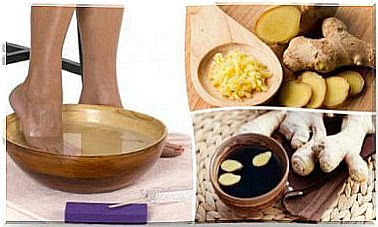Rose Hip: Natural Remedies And Contraindications
Rose hip, also known as dog rose, is the orange-red fruit that grows on rose bushes. Discover its properties, how to prepare some natural remedies and its possible side effects.

Roses have become a symbol of beauty for many cultures. However, these flowers are not the only thing that grows on rose bushes. The rose hip is a fruit that can be red, yellow or black and is found under the petals of roses.
The dog rose, as it is also known, has an oval shape and usually grows after the petals have blossomed ; that is, in early and mid fall. A study published in Antioxidants suggests that they tend to be sweeter when picked after the first frost of this season.
Although it can be eaten raw, rose hip is widely used to prepare jams, sauces and infusions. In fact, the latter are used as a natural remedy to regulate intestinal transit. Find out the properties attributed to rose hip, as well as whether there are scientific bases and contraindications for extended uses.
Rose hip main properties

Rose hip has been used in traditional medicine for over 2000 years. This is due to the contribution of different nutrients that are believed to offer benefits such as strengthening the immune system, improving circulation and kidney function, lowering cholesterol levels and preventing some chronic diseases.
Next, we will present some of the active principles that make up this fruit, in addition to analyzing its possible benefits for the health of the body.
Vitamin C
Rose hip contains interesting amounts of vitamin C ranging from 274.26 mg% ( R. canina ) to 1157.88 mg%, as noted by the Iranian Journal of Public Health . This vitamin is essential for many processes related to the health of the body.
For example, a study published in Drug Design, Development and Therapy showed that a small amount of vitamin C can significantly reduce inflammation.
This vitamin also acts as a natural antihistamine, substances known to be remedies to block allergies, and helps stimulate the production of collagen, a protein linked to the formation of connective tissue and the health of joints, ligaments, tendons and muscles. cartilage.
Flavonoids
Flavonoids are a group of phytonutrients that are found in plants or vegetables and function as antioxidants. In the fruit of the rose, flavonoids such as hyperoside, tiliroside, quercetin, catechin and astragalin are included. Among these, tiliroside stands out for its ability to reduce weight gain and visceral fat accumulation.
Carotenoids
Carotenoid pigments are responsible for the red, yellow and orange color of many plants. According to research published in the Archives of Biochemistry and Biophysics , they have antioxidant effects and can improve cognitive function, as well as eye and cardiovascular health.
They have also been linked to a decreased risk of certain types of cancer. Since humans cannot synthesize these molecules, the only way to obtain their benefits is by consuming foods that have them among their components. However, it should be mentioned that more studies would be necessary regarding this property.
Fatty acids
Rose hip also provides essential omega-3 and omega-6 fatty acids. A study published in Nutrients explains that omega-3 is capable of regulating the nervous system, blood pressure, blood clotting, glucose levels and some inflammatory processes.
Galactolipids
In general, galactolipids act as natural pain relievers. There is scientific evidence that a particular galactolipid from rose hip is capable of providing a strong anti-inflammatory action.
Other properties and active principles of rosehip
This fruit is also composed of:
- Vitamin B2 and B1
- Polysaccharides
- Essential oil
- Tannins
- Mineral salts (magnesium, iron, phosphorus and sulfur)
Natural remedies with rose hip and properties

The rose hip or dog rose has been established as an essential ingredient in natural remedies. Find out how to prepare some of the most popular tonics and infusions.
Tonic for irritated skin
Thanks to its vitamin C content, rose hips may alleviate the symptoms of some skin disorders. It is believed that it would improve skin irritation. Before starting its use, consultation with a dermatologist is recommended.
Ingredients
- 4 rosehip fruits.
- 1 cup of water.
Instructions
- Boil the water with the rose hips.
- Once the boiling point is reached, lower the flame and continue to boil for 3 minutes.
- Then, remove from the heat, cover and let it rest for 10 minutes.
- After time, strain and let cool.
- Wash your face with the toner. To do this, you can wet a sterile cotton ball or gauze with the tonic and even apply it to the neck.
- Apply 3 times a week.
Cold and flu tea
Canine rose tea could soothe cold and flu symptoms, according to popular customs and traditions. To do this traditional remedy, be sure to perform each of the steps listed below.
Ingredients
- 2 teaspoons of rose hip.
- 1 cup of water.
Instructions
- Bring the water and rose hips to a boil.
- Once at the boiling point, remove them from the heat and let it rest for 10 minutes.
- Lastly, strain and drink when ready.
Keep in mind that to sweeten you can add a teaspoon of honey, brown sugar or stevia. As for its consumption, it is recommended to take up to three cups of rose hip tea a day.
Contraindications
To date, there is no evidence that rose hip has significant side effects, so its consumption could be considered safe. However, there are not enough studies on the effects it can have on pregnant or lactating women, so the recommendation is to limit its intake and consult a specialist.
This distinction also applies to children under the age of six. Its administration through syrups, liquid extracts or tinctures is not recommended without proper medical supervision.
Now, the nutrients present in this fruit can be the cause of some contraindications if they are consumed excessively. According to one study, consuming high doses of vitamin C would cause nausea, heartburn, upset stomach, and constipation.
The same study showed that being one of the main sources of vitamin C, excessive consumption of rose hips affects people with kidney stones, sickle cell anemia and hemochromatosis.
What to remember about rose hip?
Despite being less well known than flowers, rose hip also grows on rose bushes. It is an oval fruit with a characteristic orange-red color that, in some cases, can be yellow and black.
Its properties have made it a fruit widely used for natural remedies. It provides vitamin C and other nutrients that give it certain health benefits such as fighting free radicals, reducing inflation, regulating the nervous system and improving eye and cardiovascular health.
Of course, despite the fact that its consumption is considered safe, a doctor should be consulted in the case of children under six years of age and pregnant or lactating women.









